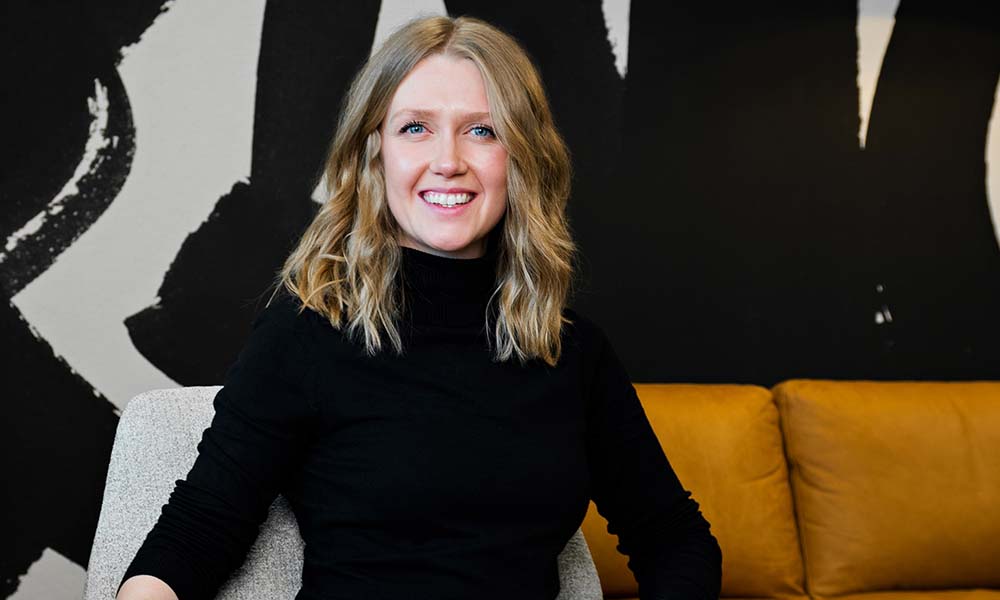Alumni Spotlight, People, Student Profile
Dr. Rhyann McKay begins with the question: “How can I help?”
May 3, 2022

About
Name
Rhyann McKay
Role
Alumna
Faculty
Health and Social Development
School
Health and Exercise Sciences
Campus
Okanagan (Kelowna, BC)
Education
PhD, Kinesiology, UBC Okanagan
Bachelor of Human Kinetics, UBC Okanagan
Hometown
Calgary, Alberta
“My heart is in conducting research that can be directly used by the people it impacts. It’s fun and exciting and I’ve found joy and meaning in the work.”
WHEN CIRCUMSTANCES ADVANCE AND CONVERGE BY CHANCE in such a way that an outcome is favourable, we like to call it serendipity. When UBC Okanagan student Dr. Rhyann McKay came across a way to combine her passions for psychology, political science and health, she called it HMKN 421 (Human Kinetics: Advanced Theories of Health Behaviour Change).
“Dr. Heather Gainforth’s course was the first class that tangibly spoke to me,” says Dr. McKay. “It linked my interests in psychology, designing policy and helping people do the things that support their health. Ultimately, it was the health promotion aspect of human kinetics that piqued my interest, and Dr. Gainforth ended up becoming my PhD supervisor.”
The world was Dr. McKay’s oyster coming out of high school, with opportunities at the University of Calgary and the University of Alberta ripe for the picking. However, during a visit with a friend attending UBC Okanagan, Dr. McKay decided where she wanted to pursue her post-secondary education. Although people attend UBCO for a variety of reasons, like being a world-renowned research university, Dr. McKay simply fell in love with the campus.
“It’s just so beautiful,” she says. “The close-knit and collaborative community and intimate learning environments provide opportunities for deep connections with professors and other researchers. As a student your voice is never drowned out like it might be in a class of 500 peers. The close proximity to Big White for snowboarding and Myra Canyon for mountain biking was also very appealing. Looking back, I know I made the right decision.”
She adds that the Centre for Health Behaviour Change, where she spent much of her time, is a special place. “It’s the home of phenomenal researchers and phenomenal women in research like Dr. Gainforth, Dr. Kathleen Martin Ginis and Dr. Mary Jung. I had the opportunity to learn from each of them and they continue to be very important to me.
“My PhD program aimed to develop and examine a behavioural counselling intervention for family support providers of people with spinal cord injury,” says Dr. McKay. A key component of her research was pinpointing behaviours that were impacted when family members or partners were put in a support-providing role. “We looked for enablers to those behaviours we want more of, and for barriers to those behaviours. Then we could address and support those factors through behaviour change techniques.”
Some of those techniques include goal setting, action planning and problem solving, which aim to address hurdles like managing time and competing priorities. The end product of Dr. McKay’s program was a behavioural counselling intervention that addressed self-care behaviour. “This could be anything that people do for themselves and no one else, from the most basic, like bathing and socializing, to getting out and exercising.”
Dr. McKay is a firm believer that research should start with the question: How can I help? During her study, she interviewed many families and partners of people with spinal cord injury who identified the need for additional tools and sources of support. “That was when I knew I was on the right track,” she says.
“Through an integrated knowledge translation approach, we equitably and meaningfully partner with people who will use the research in the end,” explains Dr. McKay, who conducted her study in partnership with Spinal Cord Injury BC, Spinal Cord Injury Alberta and Spinal Cord Injury Ontario. “These are pivotal organizations that support persons with spinal cord injury and their families, and were very instrumental during my research.” She adds: “The mentorship I received from members of these organizations was critical beyond academia.”
Dr. McKay has been recognized with UBC Okanagan’s Student Researcher of the Year award for her leading-edge research in partnership with provincial spinal cord injury organizations across Canada to co-develop behaviour change interventions.
“When I was deciding what to do after my undergrad, a mentor told me how important it was to find my joy,” Dr. McKay says. “They suggested I follow my passion and do what makes me truly happy. My heart is in conducting research that can be directly used by the people it impacts. It’s fun and exciting and I’ve found joy and meaning in the work.”